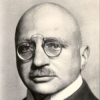Fritz Haber

Fritz Haber
Fritz Haberwas a German chemist who received the Nobel Prize in Chemistry in 1918 for his invention of the Haber-Bosch process, the method used in industry to synthesize ammonia from nitrogen and hydrogen gases. This invention is of importance for the large-scale synthesis of fertilizers and explosives. The food production for half the world's current population depends on this method for producing nitrogen fertilizers. Haber, along with Max Born, proposed the Born–Haber cycle as a method for evaluating the lattice...
NationalityGerman
ProfessionScientist
Date of Birth9 December 1868
CountryGermany